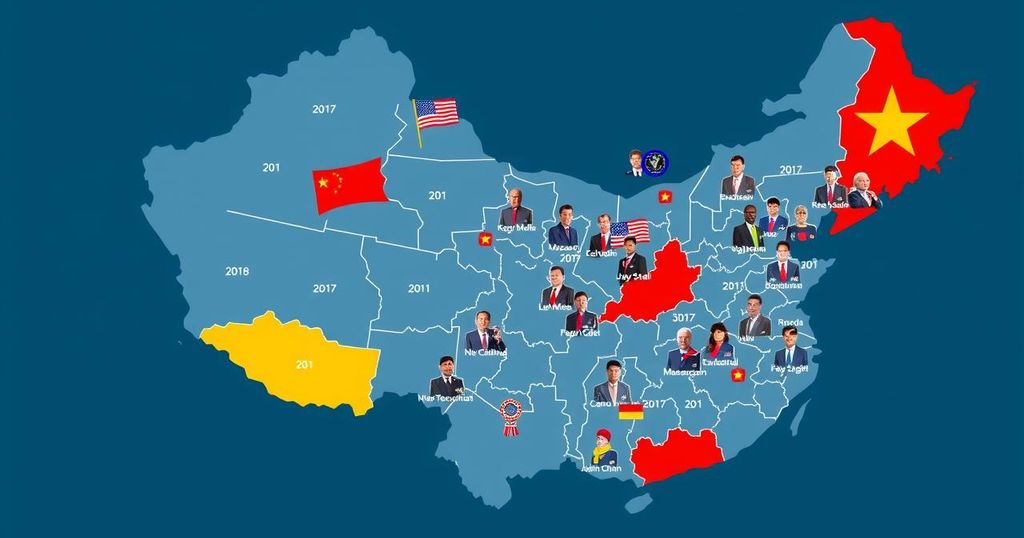World news
AMERICA, ASIA, BEIJING, BEIJING DAILY, CAPITOL HILL, CCTV, CHINA, CNN, DC, ELECTION, FOREIGN POLICY, GLOBAL TIMES, LI SHUO, MEDIA COVERAGE, MEXICO, NATIONAL SECURITY, NORTH AMERICA, NORTHERN MARIANA ISLANDS, OCEANIA, UNITED STATES, US, US-CHINA RELATIONS, WASHINGTON, WASHINGTON, DC, WEIBO, WHITE HOUSE, XI JINPING
Daniel O'Connor
0 Comments
Chinese State Media Highlights U.S. Political Discord Amid Election Results
As Americans await election results, Chinese state media emphasizes U.S. divisions and potential unrest, questioning the efficacy of American democracy and projecting skepticism about U.S.-China relations. Observations of heightened security overshadow peaceful voting, as commentary reflects a belief that tensions will persist regardless of the electoral outcome.
As the United States contemplates its election results, Chinese state media has seized the opportunity to highlight the pronounced political divisions within the country, emphasizing concerns over potential civil unrest. The narrative perpetuated by Beijing seeks to undermine American democratic values, particularly in contrast to China’s own political structure under Xi Jinping, who has consolidated power significantly. Through various reports and commentary, the focus was notably on the supposed threats of violence, neglecting the peaceful aspects of electoral participation that characterized polling day. Reports illustrated heightened security measures across Washington, D.C., framing the elections as a precursor to potential chaos rather than a celebration of democratic processes. The discourse surrounding the election on Chinese social media reflected a broader skepticism regarding the implications of the outcome, with popular sentiments suggesting that the election results would not alter the trajectory of U.S.-China relations. The stark volatility in American politics was metaphorically described through analogies like considering the nation to be divided into sections, denoting a broader perception of dysfunction. Crucially, opinions among the Chinese populace insinuated that irrespective of whether Kamala Harris or Donald Trump assumes leadership, the systematic challenges in relations between the two superpowers are likely to persist, driven by a prevailing consensus on the need for the United States to contain China’s global ascent.
The backdrop of this discussion involves a longstanding tension between the U.S. and China, elaborated upon through issues of governance and global influence. American critiques of China’s authoritarian regime have typically been met with dismissals from Beijing, viewing such critiques as hypocritical given the increasing polarization occurring within the U.S. This election period has amplified these sentiments, as China seeks to project an image of superiority to counter Western narratives regarding democracy and governance. The United States’ foreign policy approaches have undergone shifts with various administrations, marked by a trajectory of tariffs, sanctions, and strategic confrontations towards China. However, there remains a belief among many in China that American attempts to curb its influence are steadfast and forthcoming, irrespective of domestic political changes.
In summary, the narrative propagated by Chinese state media during the U.S. elections underscores a significant emphasis on portraying political discord and the potential for unrest within America. This perspective aligns with a broader critique of American democracy by Chinese authorities, reflecting Beijing’s desire to highlight perceived weaknesses in their geopolitical rival. Among ordinary Chinese citizens, there exists a consensus that, regardless of who wins the election, the challenging dynamics of U.S.-China relations will remain unchanged, revealing a deep-rooted skepticism about the efficacy of electoral outcomes in altering bilateral tensions.
Original Source: www.cnn.com




Post Comment